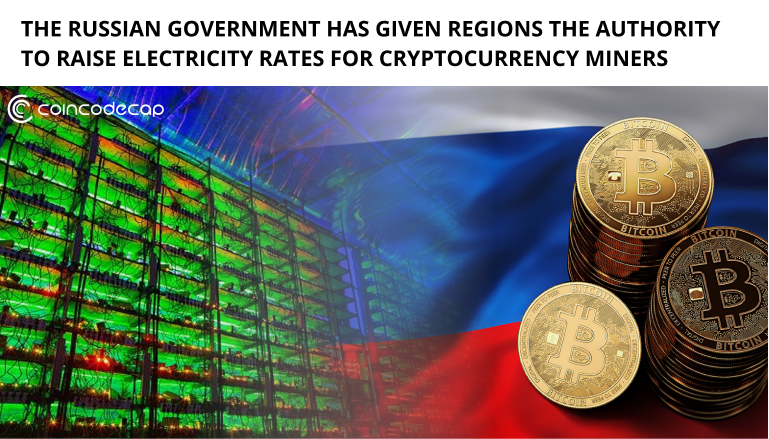Key takeaways:
- As a result of a law permitting regional authorities to limit the electrical energy supplied at favourable rates, Russians mining cryptocurrency at home may face increased electricity bills.
- According to the Russian business daily Kommersant, private users will have to pay more if their consumption exceeds certain limits.
- Household electricity tariffs in Russia are regulated by the government, which keeps them substantially below economically justified levels. Businesses pay higher charges to compensate for the differential in power pricing.

As a result of the reform, which permits regional authorities to limit the amount of electricity given at discounted prices, Russians can expect to mine bitcoin at home with increased electricity bills. The action comes after local utilities asked for the authority to limit the amount of subsidized electricity available to the general public, citing the prevalence of cryptocurrency mining in residential areas as a reason.
According to the Russian business daily Kommersant, private prospects may have to pay a surcharge if their consumption exceeds these limits. Except for Crimea, where low-cost electrical energy is already limited to 150 kWh per thirty days, other Russian regions have yet to implement new pricing plans. The Federal Antimonopoly Service and the Ministry of Energy have stated that the new policy is targeted at reducing “inappropriate energy consumption” and will not increase prices for the majority of consumers.
Also, read Bank of Russia Might Restrict Crypto Investments
In Russia, residential electricity tariffs are regulated by the government, which keeps them much below economically justified levels. Companies are charged more by power utilities to compensate for the difference. According to information from Russia’s vitality markets regulator, corporations are expected to spend over 240 billion rubles (about $3.3 billion) in 2021 to fund this ‘cross-subsidization.’
Last year, the average monthly usage per family in the Russian Federation was around 250 kWh, according to a report published in the newspaper Kommersant. Around 40% of apartment complexes’ homes now use energy above 600 kWh per month.
In Russia, residential electricity tariffs are regulated by the government, which keeps them much below economically justified levels. Companies are charged more by power utilities to compensate for the difference. According to information from Russia’s vitality markets regulator, corporations are expected to spend over 240 billion rubles (about $3.3 billion) in 2021 to fund this ‘cross-subsidization.’
Last year, the average monthly usage per family in the Russian Federation was around 250 kWh, according to a report published in the newspaper Kommersant. Around 40% of apartment complexes’ homes now use energy above 600 kWh per month.
Also, read Bank of Russia Says Digital Ruble Should Not Boost Inflation
Following recent changes to a federal government decree, all other areas, including annexed Crimea, will be able to implement varied electricity rates. The adjustments follow complaints from Irkutsk Oblast electricity distributors and authorities about the rapidly expanding number of crypto farms in residential structures.
Household electricity in Irkutsk, called Russia’s crypto mining capital, costs only 0.86 rubles ($0.01) per kWh, compared to 4.25 rubles (almost $0.06) in the rest of Russia. Earlier in December, media reports showed that Irkutskenergosbyt, a local energy provider, had brought 85 cases against at-home miners this year.
Mining is one of several crypto-related activities that escaped the reach of the “On Digital Financial Assets” regulation, which partially controlled the Russian crypto market in January. Officers in Moscow have been calling for it to be recognized as a business venture and taxed properly. This would also allow utilities to charge miners more for the energy they use to create a digital currency. A working committee established by the State Duma recently conducted its first meeting to discuss laws for mining and other aspects of the crypto industry.











